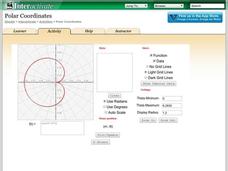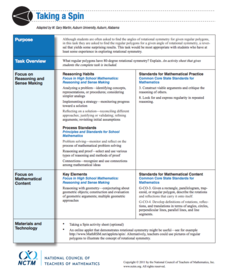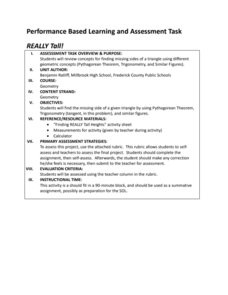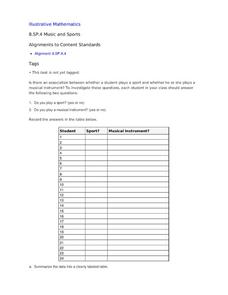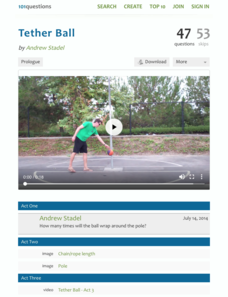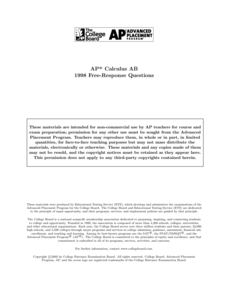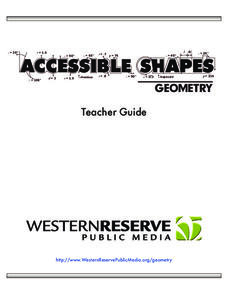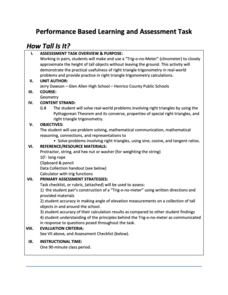Shodor Education Foundation
Polar Coordinates
Polar opposites might not work together—but polar coordinates do! The interactive provides learners the opportunity to graph trigonometric and algebraic functions using polar coordinates. The program takes either individual data points...
National Council of Teachers of Mathematics
Taking a Spin
It does not divide into 360 evenly, so it cannot work. The resource extends pupils' thinking about rotational symmetry. By asking for a figure with a rotational symmetry of a seemingly impossible angle, the activity requires learners to...
Pace University
Grade 7 Earth Day Statistics with Circle and Bar Graphs
Take a tiered approach to studying waste. The lesson uses Earth Day to present differentiated instruction around using circle and bar graphs. Each group gets a cube based on their tiers and works collaboratively as well as individually...
Radford University
REALLY Tall!
Conduct indirect measurements three ways. Working in groups, pupils come up with different ways to measure three tall objects indirectly. The teacher provides measurement information requested by the teams, and learners then calculate...
Radford University
Box-and-Whisker Activity
Think inside the box. Working in small groups, pupils design a study to answer comparing two data sets. Team members collect data and construct box-and-whisker plots and analyze them to prove or disprove their hypothesis. They develop...
Illustrative Mathematics
Christina's Candies
Help Christina figure out how many chocolate and lemon candies she has with a lesson on decomposing numbers. When presenting this context to the class, the teacher chooses the total number of candies and the number that are chocolate,...
National Security Agency
Are You Game? A Lesson Connecting Fractions and Probability
Exactly how fair are the board games children grow up playing? Young mathematicians investigate this questions as they work their way through this five-lesson series on basic probability.
BW Walch
Creating and Graphing Exponential Equations
Frequently found in biology and economic application problems, exponential equations show up as stars in this introductory presentation. Taking no background or knowledge of exponentials for granted, the slides walk learners...
Curriculum Corner
Number Family Practice Page
Using their knowledge of the associative and commutative properties of addition, class members work with fact families to create two addition and two subtraction problems with three given numbers.
California Mathematics Project
Model Solar System
The sun's diameter is 864,337 miles—challenge learners to create a scale model of the solar system that fits in your classroom. Scholars make conversions and work with scientific notation as they create the scale model.
Illustrative Mathematics
Measuring Blocks
Stack them together to get a measurement. The short activity has pupils work in pairs to measure the lengths of two blocks and then determine the length of the two blocks together. The groups then determine an equation that represents...
Super Teacher Worksheets
Ten Frames
Developing a strong number sense in the primary grades is essential to the success of young mathematicians. These simple worksheets present learners with a series of ten-frames, asking them to write the number shown in each model....
Curated OER
Music and Sports
With so much talent in the classroom, do your musicians and athletes have related interests? This problem has your learners taking data from their classmates to decide whether there is an association between the two activities. The...
Jesuit High School
Geometry Sample Problems
I'd like to prove that this worksheet has a lot to offer. Seven problems using triangles and parallelograms practice the traditional method of a two-column proof. After the worksheet is some practice problems that show worked out...
Balanced Assessment
Fermi Estimates II
How many hot dogs does Fenway Park go through in a year? Learners estimate answers to this question and more as they work through the task. Problems require participants to make assumptions and use those assumptions to make estimations.
Illustrative Mathematics
Coordinates of Equilateral Triangles
Can it be constructed? The task poses the question whether it is possible to have an equilateral triangle with its vertices located at integer coordinates. Pupils work with their knowledge of trigonometric ratios and the Pythagorean...
101 Questions
Tether Ball
All work and no play makes for a boring classroom! Bring back memories by analyzing the patterns of a tether ball. Given the dimensions of the ball, pole, and rope, young scholars must determine how many times the ball will wrap around...
College Board
1998 AP® Calculus AB Free-Response Questions
Take a peek into the exam. Released items from the Calculus AB exam provide pupils insight into how questions appear on the exam. The six questions range from finding the area under a curve and the volume of the revolution to working...
PBS
Accessible Shapes
All the 2-D and 3-D measurement work you need is in one location. Divided into three sections, the geometry lesson plans consist of visualization of three dimensions, classifying geometric figures, and finding surface area and volume....
Curated OER
Side-By-Side Division Algorithms
Show classes how to work their way through the algorithms. The long division lesson plan shows five algorithms in dividing multi-digit numbers by a single digit. The algorithms include partial quotients, stacking method, place value long...
Radford University
2 and 3 Dimensional Shapes
Take a similar approach to three dimensions. Pupils develop the relationship between areas of similar objects and see how they relate to the ratio of the sides. Building upon area formulas, small groups put together volume formulas for...
CK-12 Foundation
Values Written as Powers: Binary Numbers 1 to 8
A six-question interactive tasks scholars with adding binary numbers one through eight. A tool acts as a visual aid to showcase the patterns made when working with base—2, digits zero and one. Question types include fill in the blank,...
Radford University
How Tall Is It?
Find the height from afar. Teams role play as summer interns to find the height of a set of windows from the outside. Scholars must first determine how to find the height with the available tools. After determining a strategy involving...
Radford University
Surface Area of Boxes
Explore surface area out of the box. Pairs investigate surface area by measuring two boxes and calculating the area of each side. Classmates trace one of the boxes onto butcher paper and create a net with the same area. Groups then...


